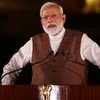PM Narendra Modi pitches to introduce farm education in middle schools
To impart knowledge about agriculture and farming practices among young minds, Prime Minister Narendra Modi suggested that the subject be included in the curriculum at the middle-school level.
Prime Minister Narendra Modi on August 29, 2020 pitched to take farm education to the middle-school level, saying necessary reforms have been made to this regard in the National Education Policy (NEP) 2020.
"There is a need to take knowledge related to agriculture and its practical application to school level. Efforts are (on) to introduce the Agriculture subject at middle school level in villages," PM Modi said.
This will develop agriculture-related understanding among students and enable them to relay the information about agriculture, modern farming techniques and marketing to their family members, he said, adding that it will promote agro-entrepreneurship in the country.

PM Narendra Modi.
"For this, many reforms have been made in the National Education Policy," PM Modi said in an address after the virtual inauguration of college and administration buildings of Jhansi-based Rani Lakshmi Bai Central Agricultural University.
The NEP approved by the Union Cabinet last month replaces the 34-year-old National Policy on Education and is aimed at paving the way for transformational reforms in school and higher education systems to make India a global knowledge superpower. Asserting that steady efforts are being made to connect farming with modern technology, the Prime Minister noted that research institutions and agricultural universities have a vital role to play.
Currently, there are three central agricultural universities in the country, compared to just one university six years ago. Besides this, three more national institutions — IARI Jharkhand, IARI Assam, and Mahatma Gandhi Institute for Integrated Farming in Motihari, Bihar — are being established.
He remarked that these institutions will not only give new opportunities to students, but will also help to increase their capacity and provide technological benefits to local farmers. PM Modi further said that in the last six years, the government has endeavoured to establish a link between research and farming, and to provide scientific advice to farmers at the ground level in villages. He sought the cooperation of the universities to develop the ecosystem to streamline the flow of knowledge and expertise from the campus to agriculture fields.

A representational image of a session in progress at school.
Picture credit: Teach for India
On the use of modern technology in tackling farm sector challenges, PM Modi cited the recent locust attack and said the government worked on war footing to control the spread of the attack and reduce the damage. He mentioned that dozens of control rooms were set up in several cities, arrangements were made to alert farmers in advance, and drones were supplied for spraying pesticides. Additionally, dozens of modern spray machines used to kill locusts were procured and provided to farmers.
Asserting that the farm sector has a major role to play in making India 'Aatmanirbhar' (self-reliant), PM Modi said,
"When I talk about aatmanirbhar in agriculture, it is not limited to food grains but the self-reliance of a village/rural economy."
Self reliance in agriculture aims at making farmers both the producer as well as the entrepreneur. The growth of farmers and the overall farm sector will lead to creation of jobs at village level, he said. To further boost the farm sector and double the income of farmers, the Prime Minister said the government is taking several historical reforms in the sector. He listed out the amendments in the Essential Commodities Act and ordinances to allow farmers to sell outside mandis.
"Just like other industries, now farmers can also sell their produce anywhere in the country, wherever they fetch better prices," he said, adding that a special dedicated fund of Rs 1 lakh crore has been set up to provide better facilities and promote industries in a cluster-based approach.
Earlier, interacting with the students of Rani Lakshmi Bai Central Agricultural University, the Prime Minister expressed concern over the whopping Rs 75,000 crore edible oil import bill and asked for solution from the students to address this issue.
He also stressed on the need to boost food processing levels and create awareness among farmers about micro, drip and sprinkler irrigation in the drought-prone Bundelkhand region and other parts of the country.
During the interaction, the Prime Minister also stressed on promoting recycling of water and rainwater harvesting through innovative and less costlier technology in the region. He also mentioned that Israel's water technology can be of use.
He talked about the need to increase agro-forestry, reduce the consumption of chemical fertiliser, and adopt of organic farming as well as zero budget farming. Rani Lakshmi Bai Central Agricultural University started its first academic session in 2014-15 and offers both under-graduate and post-graduate courses in agriculture, horticulture, and forestry. It operates from the Indian Grassland and Fodder Research Institute, Jhansi as the university campus is under construction.
Agriculture Minister Narendra Singh Tomar, Ministers of State for Agriculture Parshottam Rupala and Kailash Choudhary, Uttar Pradesh Chief Minister Yogi Adityanath, and other senior officials were present ay the virtual event.
Edited by Kanishk Singh








